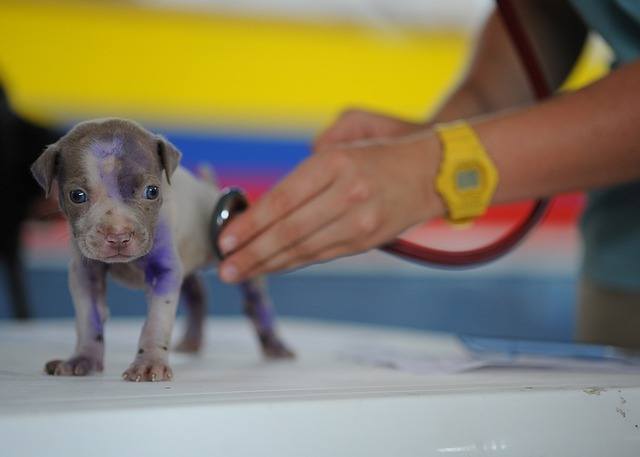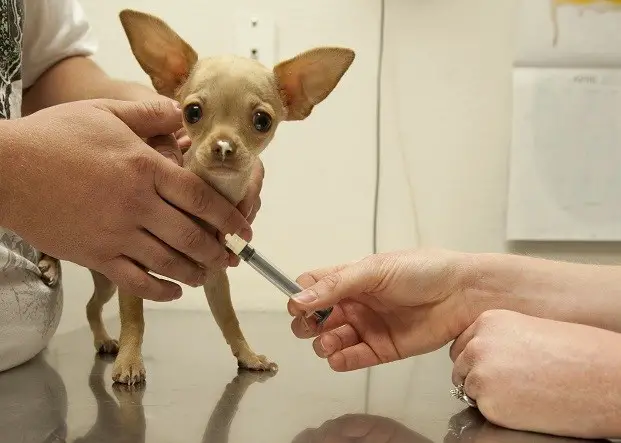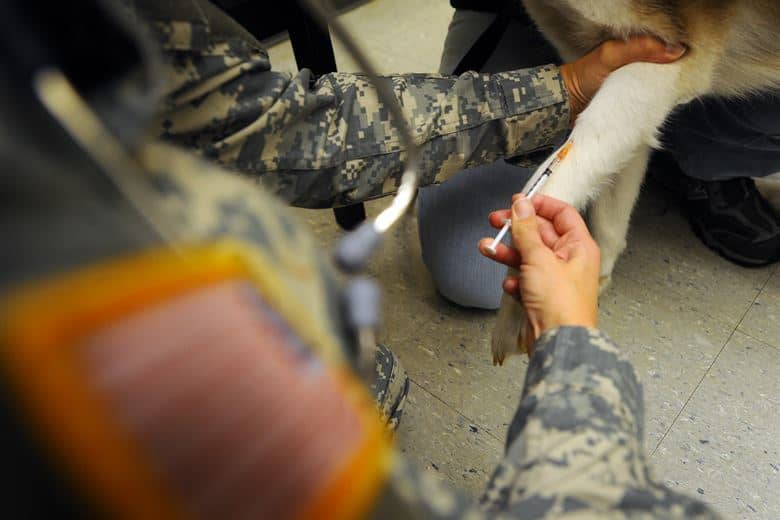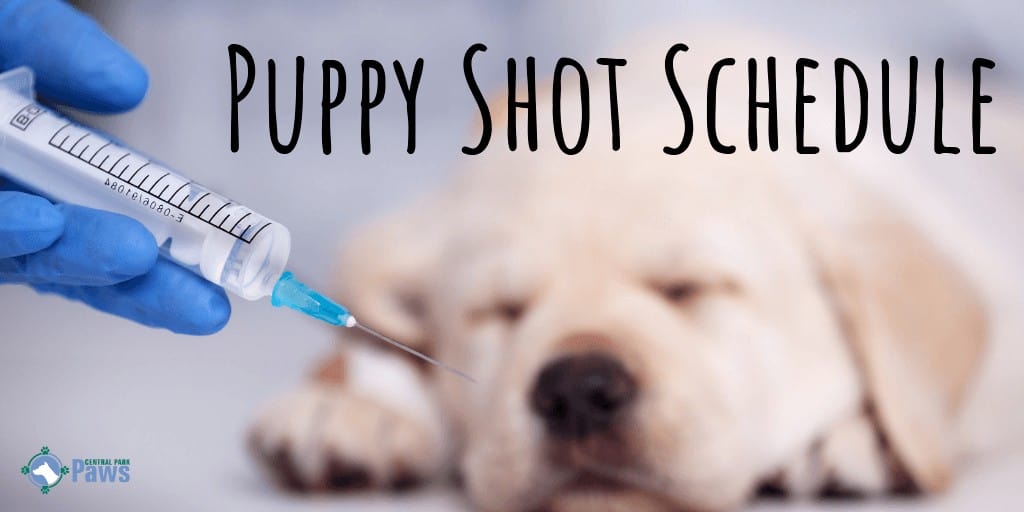As I was preparing to bring my puppy Maggie home, I was told by many friends and family members who had raised their own puppies that I needed to prepare for vet visits.
Puppies need to go to the vet very often during their first year at home. It’s crucial for the vet to monitor their growth, health, and vaccinations.
The number of puppy shots you’ll need to look forward to may be overwhelming, so here’s everything you need to know about the typical puppy shot schedule.
| Age | Recommended Vaccinations | Optional Vaccinations |
|---|---|---|
| 6-8 weeks | DHPP | Bordetella, Measles |
| 8-12 weeks | DHPP | Coronavirus, Leptospirosis, Bordetella, Lyme disease |
| 12 weeks+ | Rabies | None |
| 14-16 weeks | DHPP | Coronavirus, Lyme disease, Leptospirosis |
| 12-16 months | Rabies, DHPP | Coronavirus, Leptospirosis, Bordetella, Lyme disease |
| Every year | – | Coronavirus, Leptospirosis, Bordetella, Lyme disease |
| Every 3 years (after initial booster) | DHPP | – |
| Every 1-3 years | Rabies (as required by law) | – |
Why Puppies Need Shots
Before puppies go home at eight weeks, they haven’t really been exposed to the world.

Their immune systems are still developing, so they’re kept in their own space or one shared with their mom and siblings. They need regular shots to keep them safe from the world they’re encountering as they grow.
The shots also need to be spaced out because their tiny systems can’t handle all the shots at once.
Taking your puppy to the vet is just part of the schedule you’ll need to follow with your new puppy.
How Many Vaccinations Puppies Need
After they turn eight weeks old, puppies need to get vaccinated every two to four weeks until they’re 14 weeks old. After that, their bigger vaccinations will wait until they’re six months and twelve months old.
When Maggie was a baby, I thought the vet trips were a little overboard. Then I learned what they were for.
With each vaccination, she got a little more freedom and her health stayed safe. Keeping your growing pup safe is totally worth the visits and vet bills.
Which Shots are Required by Law?
It may surprise you to discover this, but only the rabies vaccine is required by law.

Some states allow dogs to get the vaccine later in life, but most vets recommend that puppies start their shots around 16 weeks old.
Other vaccines are not mandatory, but it’s best to make sure your puppy gets them. These are called the canine core vaccines. Your vet will make sure your puppy gets them in the order that they need according to their age.
These vaccines are the ones for canine distemper, parvovirus, and hepatitis.
When to Give Your Puppy Shots
Breeders should give puppies their vaccinations every 2 to 4 weeks after they’re born, and it’s the dog owners responsibility to take over the vaccines after puppies go home at eight weeks old.
Your vet will give you specific guidance as to when your puppy needs vaccinations according to the laws of your state and where you live, but you can follow the general guideline above to know what you can expect over your puppy’s first year at home.
Puppy Shot Schedule

Each puppy vaccination helps different aspects of their health.
There are so many ways for puppies to get sick because they haven’t built up an immunity to anything.
While you’ll be able to take care of, say, ear mites at home, the following diseases are much more serious.
Here’s what each vaccination does so you can better understand how they’ll help your puppy.
Canine Distemper – 6-8 Weeks
Distemper is a terrible airborne virus that unvaccinated dogs and puppies are especially susceptible to.
It’s a virus that attacks the nervous, gastrointestinal, and respiratory systems. Puppies can get it from other dogs, as well as skunks, raccoons, and other small animals.
It’s most commonly received through airborne exposure, although dogs can get it from sharing toys or bowls with other dogs.
Distemper starts out as a fever, with slightly reddened eyes and discharge from the nose. As the disease spreads, the infected dog will become tired and resist eating. Vomiting and diarrhea can also appear as symptoms, as well as continuous coughing.

A complete list of symptoms include:
- Coughing
- Fever
- Discharge from the nose and eyes
- Diarrhea
- Vomiting
- Paralysis
- Seizures
There’s currently no cure for distemper, which is why the vaccine is crucial.
Canine Parainfluenza – 6-8 Weeks
Another highly contagious virus is parainfluenza.
It’s a respiratory virus that can sometimes be mistaken for influenza, but they require two different vaccinations.
Parainfluenza can result in:
- Coughing
- Lack of appetite
- Loss of energy
- Nasal discharge
Puppies can get it from being around other dogs, public spaces, or even groomers.
Parvovirus – 10-12 Weeks
If you’ve been a previous dog owner, you may have heard of parvo before.
It mostly affects puppies between six weeks to six months old.
They get it if they sniff or lick anything that’s been touched by contaminated feces, so it’s easy to contract if puppies are out in public or at dog parks.

Symptoms may include:
- Exhaustion
- Anorexia
- Weight loss
- Dehydration
- Vomiting
- Diarrhea
- Fever
These symptoms are especially noticeable in young puppies, since they’ll naturally have high levels of energy and want to eat all the time.
DHPP – Multiple Shots Starting at 10-12 Weeks
The DHPP vaccine contains many vaccinations in one.
It protects your puppy from distemper, parvovirus, and hepatitis, as well as parainfluenza. This combo vaccine may be the most powerful one your puppy gets.
Rabies – Multiple Shots Starting at 12-24 Weeks
Rabies may be the most well-known virus that a dog can contract, and puppies get multiple vaccinations against it in their first year.
They can only get it from the bite of an infected animal, but it works quickly.

An infected dog will experience a burst of energy before facing paralysis in their limbs. The paralysis then moves to the face, locking their jaw.
Other common symptoms are:
- Eating dirt or stones
- Dehydration
- Anorexia
- Agitation
- Anxiety
Since many of the symptoms for these common puppy diseases may not appear to be symptoms of a disease at first, puppies may not get the help they need in time.
The rigorous vaccination schedule each puppy undergoes at a vet is for their own good.
What Do Puppy Vaccines Protect Against?
There are many different types of puppy vaccines you can get for your dog, which depends on the vet clinic you visit, the age of your puppy, and many other factors.
These are a few of the things puppy vaccines protect against and why they are important:
- Bordetella Bronchiseptica
- Canine Distemper
- Canine Hepatitis
- Canine Parainfluenza
- Coronavirus
Click the plus button for more info on each of these diseases.
Where to Get Puppy Shots
Your dog can get puppy shots at any vet clinic, animal hospital, or even some pet supply stores.
It depends on if a location has a partnered veterinary service.
You can also look into mobile pet vaccination clinics, which often are low cost and closer to home.
How Much Are Puppy Shots?

You’ll have to pay exam fees, which differ for each clinic.
Some clinics only charge $25 for an exam, but others can charge up to $100.
The cost per vaccine should also be considered as well, although it’s difficult to predict a number specifically for each vaccine because you can get them at different prices in different locations.
Vaccines on average will cost between $75-$100 each, rounding out a standard vet trip with your puppy to between $200 and $300.
You can also look into special clinics that offer lower rates.
Any type of clinic will answer all of your specific questions during a phone call, so you can always call ahead and get an estimate before you schedule a check up.
What to Expect from Vet Bills
It’s difficult to know what to expect from your vet bills once you start going in with your puppy to get their vaccinations.

Not every veterinarian office will charge the same amount for every visit or vaccination.
You can always call ahead and ask for a price estimate before an appointment. This is especially good to do before you go in for your puppy’s first vaccination appointment because it shows a couple of important things:
First, it’ll show if your vet is willing to work with you.
Most vets should be able to provide an estimate with no hassle. Vaccinations are standard, so there shouldn’t be much flexibility in pricing within the one office.
Second, you’ll get to know your vet’s office better. You want to go to a clinic where the staff is friendly and welcoming.
Especially if you’re a first time dog owner, those staff members will be the ones answering all of your questions at appointments and during phone calls.
Possible Reactions
Sometimes when humans get a vaccine or flu shot, you can feel not quite yourself afterwards.
Dogs sometimes experience the same thing, with symptoms like:
- Fever
- Loss of appetite
- Vomiting, diarrhea
- Sluggishness
- Paw swelling
- Swelling around the injection site
- Difficulty breathing

These symptoms are quite rare, otherwise the vaccines would not be recommended or would be replaced.
If you know your dog’s parental history, discuss it with your vet in case you have any concerns that your puppy may have inherited any health sensitivities regarding vaccinations.
Concerns/Risks
According to the American Veterinary Medical Association, there are some bad reactions that can occur from puppies getting vaccines, but they are extremely rare.
The benefits far outweigh any risks that your puppy may experience because every vaccine prevents your dog and the dogs around you from becoming sick.
Rare reactions include things like brain swelling and unexplained seizures.
One Chicago dog owner had to take her dog to a specialized clinic for brain swelling after receiving a vaccine, but it was due to a predisposition to allergies.
After an investigation, no evidence was found to link the vaccine and the dog’s brain swelling.
You can always talk with your puppy’s vet about your concerns, but remember that they will always have your dog’s best interest in mind when treating them.
Conclusion
Preparing to bring your puppy home will require time, energy, and more money than you may have initially thought.
Dogs require supplies, so when you pay for everything your pup will need and then realize you still have vet visits in your future, puppy vaccinations may seem like a pain.
Vaccinations are some of the best things your puppy will receive in their first year of life.
Ultimately, they’ll be able to protect themselves from many common diseases that are completely preventable.
Trust the vaccination process and that your vet will do everything in their power to help your puppy grow into their strongest and healthiest self.
By the time your puppy turns one year old, you’ll forget the many vet trips and only need to think about vaccinations at their annual checkup.
FAQs
How Old Should a Puppy Be to Get Shots?
Your puppy should start receiving their vaccinations between six and eight weeks old, which will continue until their first one-year check up.
The frequency of the vaccinations will depend on what’s required in your state and what your vet recommends for your puppy.
How Many Shots Are Needed?
Your puppy will receive the core vaccines, which are hepatitis, leptospirosis, parvo, distemper, and parainfluenza.
They also receive their rabies vaccination, which may happen at least twice before their first birthday.
These core vaccines are administered at 6, 12, and 16 weeks old.
That adds up to an average number of 18 total vaccinations over the first few months of life.




